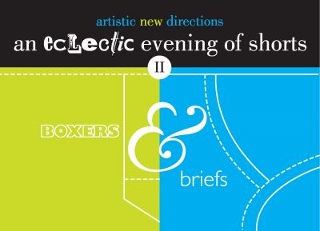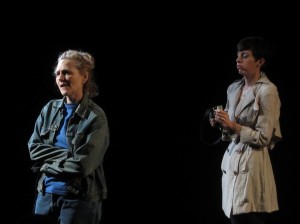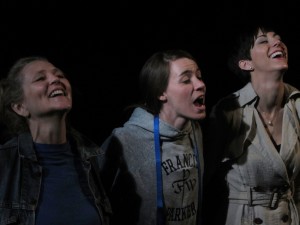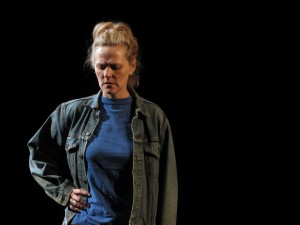A SHOWCASE FOR EMERGING ARTISTS
When watching Artistic New Directions’ presentation of An Eclectic Evening of Shorts: Boxers and Briefs VI, a collection of six ten-minute plays, plus three short improvisational pieces, one must keep in mind that these are not so much completed works as they are works-in-progress, exercises that give playwrights, directors and actors a chance to present their collaborations to a real audience and in the process allow them to hone their craft. There is minimal rehearsal time and a miniscule budget but for an emerging artist of the theater the experience of participating in such an event is invaluable and must be encouraged, regardless of the quality of the final product.
Having said that, the first offering in the program, Marti Maley’s NonStop from Florida, directed by Scotty Watson, is misguided in nearly every way. Two young woman, Annie (Caitlin Venedam) and Mary (Elena Tarsitana), flying back to New York from the Sunshine State, find themselves seated in the same row with an empty seat between them. This seat is eventually taken by Jake (Michael Coyne), a New York attorney. Rounding out the cast is Xavier Fan as Ben, a flight attendant.
Although competently structured, the ideas in this comedy are high-concept. The initial animosity between the two young women never feels believable. Observations about New York City – the subway, the homeless, the Staten Island ferry – are too general, out of date and don’t ring true. The establishment of the space is hit-and-miss; one gets the sense that the actors are pretending to be on an airplane rather than “being” on one. And the twist at the end has the subtlety of a pie in the face.
In Gregory Fletcher’s The Moon Alone, directed by Troy Miller, a young woman (Bridget Ori) confronts her former lesbian lover (Lue McWilliams, credited simply as Woman, though perhaps Older Woman would be more appropriate) at a dog park. The younger woman, who’s since married a man, begs her embittered ex to come back into her life as a friend.
This heartfelt little play boasts some lovely sentiments and interesting dialogue, with halting speech and pauses that add flavor. The acting feels generally solid, though one can’t help speculating what it would have been like with a few more rehearsals. The most exciting and excited performance is delivered by Leigh Dunham in her portrayal of Val, a girl at the park who serves as a bright new light that shines on and warms the two former lovers.
A few elements are distracting however, first and foremost the casting of the ex-girlfriends: Ms. Ori is a young, statuesque beauty, who gives off the vibe of someone educated and hip. Ms. McWilliams is not only so much older as to make a relationship between the two feel perverse, but she also has the weathered expression and rugged manner of a member of a road crew; the two simply don’t feel like they would match up. The point is not that these relationships don’t happen in real life but that dramatically the apparent mismatch is too sensational to be believable without some sort of exploration. Another distracting element is the gesture of ecstatic exuberance at the climax. As is it feels sentimental; not enough transpires between these characters for it to work. Both issues suggest that perhaps the play might be better off being somewhat longer, with stakes and resentments and characters’ histories worked out a little bit more.
Barbershop, written by Kristine Niven and directed by Janice L. Goldberg, takes place in, oddly enough, a barbershop, which is owned by the aging, old-school barber Al (Gene Santarelli), and his new partner, a young hipster named Jaydon (David Nelson Taylor). Jaydon tries to convince the older man to modernize the place, turn it into a haven for the young, new Brooklynites, and naturally Al is resistant. A warm, sweet play about the conflict between the old and the new generation, Barbershop makes a number of clever observations about hipster culture. The actors render their characters believably; they seem grounded and do a good job defining the space they are in. The ending doesn’t feel completely believable and it probably would not have hurt to add a bit more bite and drama to the story; good and kind characters can still have serious conflicts with significant stakes.
By far the best play in the showcase is The Horses in Central Park, written and directed by Paul Hufker. This tight, sinewy, and quite moving short follows two horses, Snowy (Emily Firth) and Hope (Mallory Hawks) as they pull a carriage (Central Park isn’t actually mentioned in the script, and the play would be better off without it in the title). As they trot the couple talk of what pains them and what makes them happy, they talk of their dreams and their love for one another, and they talk of turning left up the road instead of right as their coachman always commands and as they have always done. There is real, sophisticated human tragedy in Mr. Hufker’s creation, and his directorial choices – street clothes instead of costumes, no props, using female actors even though one of the horses appears to be male – are spot on. Ms. Firth does a very fine job conjuring up her equine but Ms. Hawks’ work in that department is outstanding. The fluid motions of her head, neck and torso, the sadness in her eyes are transportive, demonstrating remarkable powers of observation, absorption and reinvention.
Essentially a monologue of a divorced and possibly psychotic father (Jeffery Swan Jones) disgruntled over the limitations placed on him regarding visiting his five-year-old son Joey (Jacob Callie Moore), Team Abba is a satisfyingly subversive little squirt of lye by writer Robin Goldfin and director David Carson. The “abba” in the title refers to a Hebrew word which means father, in this case Joey’s father, whose visitations were restricted after he knocked down a little girl after the child hit his son on a playground. Now Joey wants abba to punch his grandma; one gets the sense that little Joey is a sociopath in the making. Mr. Jones gives a tart performance, injecting an appropriate amount of menace into his character, even when he speaks lovingly of and to his son; it’s as if he gets pleasure subverting him. Mr. Jones’s performance is in one key however and it would have been nice to see some variance, perhaps at times a little more vulnerability. The musician is played by Gilad Ben-Zvi. Music by Oren Neiman.
The Coffee Hour, written by Donald Steele and directed by Michael Boonstra, asks the question: How does an ordinary religious person serve God if they are not touched by Him. This issue is explored simply and remarkably unpretentiously (the play is not preachy) through an interaction between Phyllis (Ruth Sherman) and Bonnie (Carrie Keskinen). Both performers have a firm grasp of their characters and although the ideas expressed aren’t innovative or exciting they are sincere, even truthful, and, admirably, they don’t overflow the dramatic vessel which contains them.
The three improvisational skits are the most blatantly entertaining part of Boxers and Briefs, and with one exception the actors acquit themselves competently in these trifles.
An Eclectic Evening of Shorts: Boxers and Briefs VI
Artistic New Directions at Theater 54 in New York City
ended on March 31, 2013
for more info, call (212) 875-1857 or visit http://www.artisticnewdirections.org/index.html




